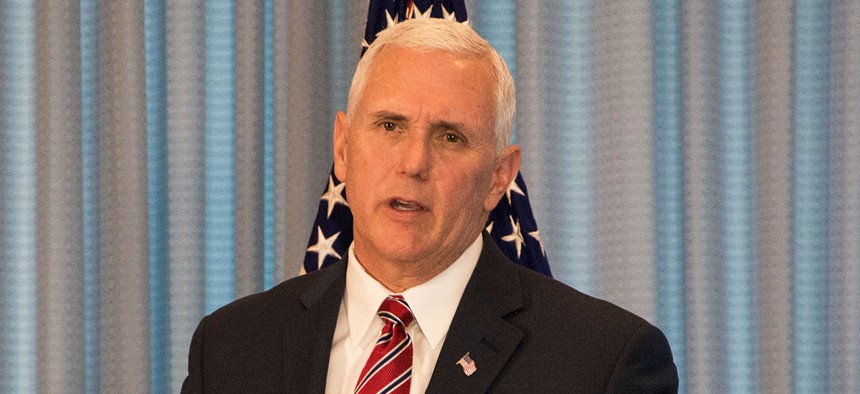
Master Sgt. Raquel Griffin/Air Force
Mike Pence Lawyers Up
The vice president has hired former federal prosecutor Richard Cullen to represent him as the Russia investigation gathers steam.
Vice President Mike Pence has hired an outside lawyer to represent him during the Russia investigation, a sign that key members of the administration are gearing up for a protracted legal tug-of-war with Congress and Special Counsel Robert Mueller.
According to The Washington Post, Pence tapped prominent Virginia attorney Richard Cullen to serve as his outside counsel in the ongoing congressional and criminal probes. Cullen comes with a strong background in criminal-justice matters: He previously served as the state’s attorney general and as the chief federal prosecutor in its prestigious Eastern District in the 1990s before returning to private practice. The Post said Pence spent “several weeks” interviewing potential candidates, suggesting he began the process shortly after Trump ousted former FBI Director James Comey on May 9.
There have been no indications that Pence himself is a subject of or person of interest in any aspect of the sprawling Russia investigation, including questions of whether Trump committed obstruction of justice. But his possible presence at the White House during key moments to date could make him a potential witness as federal investigators delve into Trump’s treatment of the inquiry. Mueller could interview the vice president about what he saw before and after the firings of both former National-Security Adviser Michael Flynn in February and Comey in May, for example.
Hiring Cullen runs counter to the advice Marc Kasowitz, a Manhattan-based corporate attorney and Trump’s longtime legal fixer, reportedly gave to White House staff after the president hired him as outside counsel last month for the Russia probe. According to The New York Times, Kasowitz recently told worried staffers it wasn’t yet necessary to hire private attorneys, even as Mueller’s inquiry and congressional investigations continue to intensify.
Bringing in outside counsel is common for top executive-branch officials when a criminal or congressional inquiry sets its sights on the president or his inner circle, even for those not under investigation for wrongdoing. Top aides in the Bill Clinton and George W. Bush administrations paid hefty legal fees to the lawyers who represented them for years during the Whitewater and Monica Lewinsky probes and the Valerie Plame investigation. Trump’s White House staff may face similar financial and legal woes now that the Russia inquiry has expanded to include obstruction-of-justice allegations against the president.
Presidents under investigation can also rack up extensive costs. Bill and Hillary Clinton, for example, left the White House in 2001 with multimillion-dollar legal debts to the phalanx of attorneys who represented them through multiple federal inquiries and the impeachment hearings. (Lucrative book deals and six-figure speaker fees helped them pay off those costs within four years.) But Trump’s substantial wealth will likely forestall the need for any extraordinary measures on his part to pay off any fees he accrues in the years to come—a luxury many in his White House won’t enjoy.







